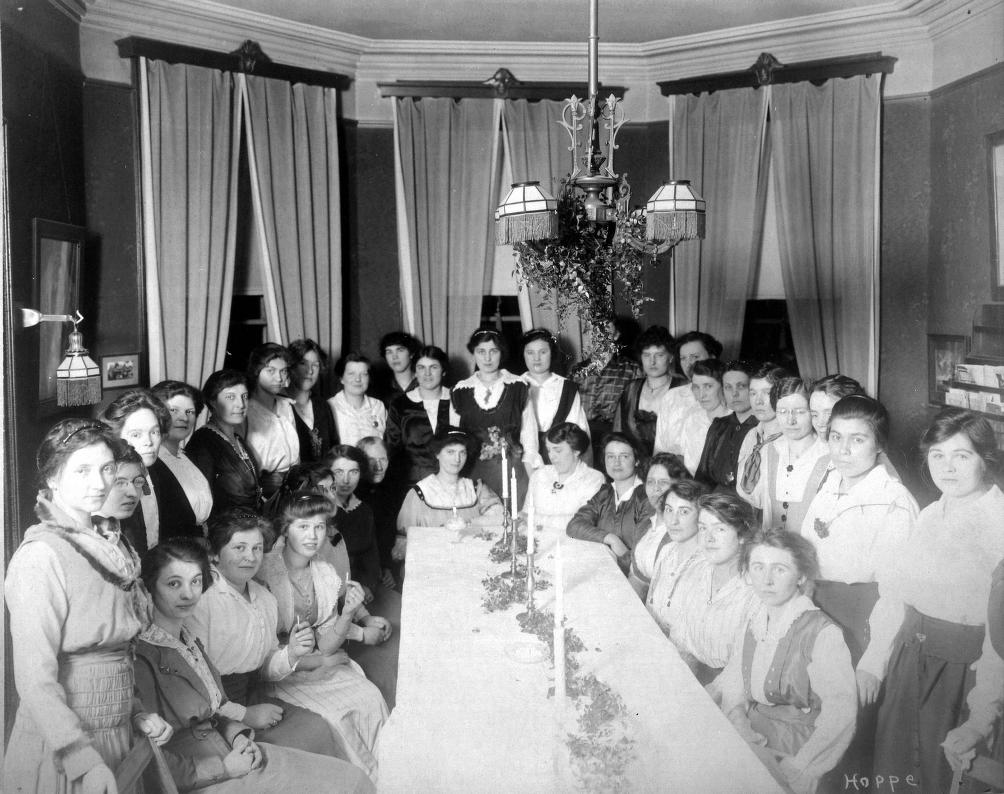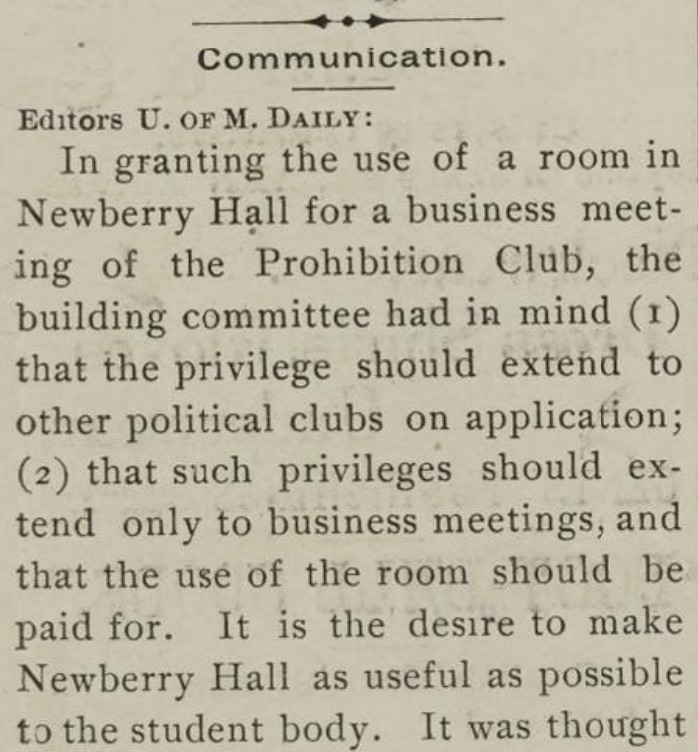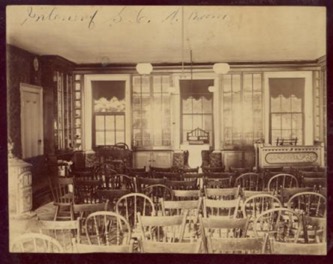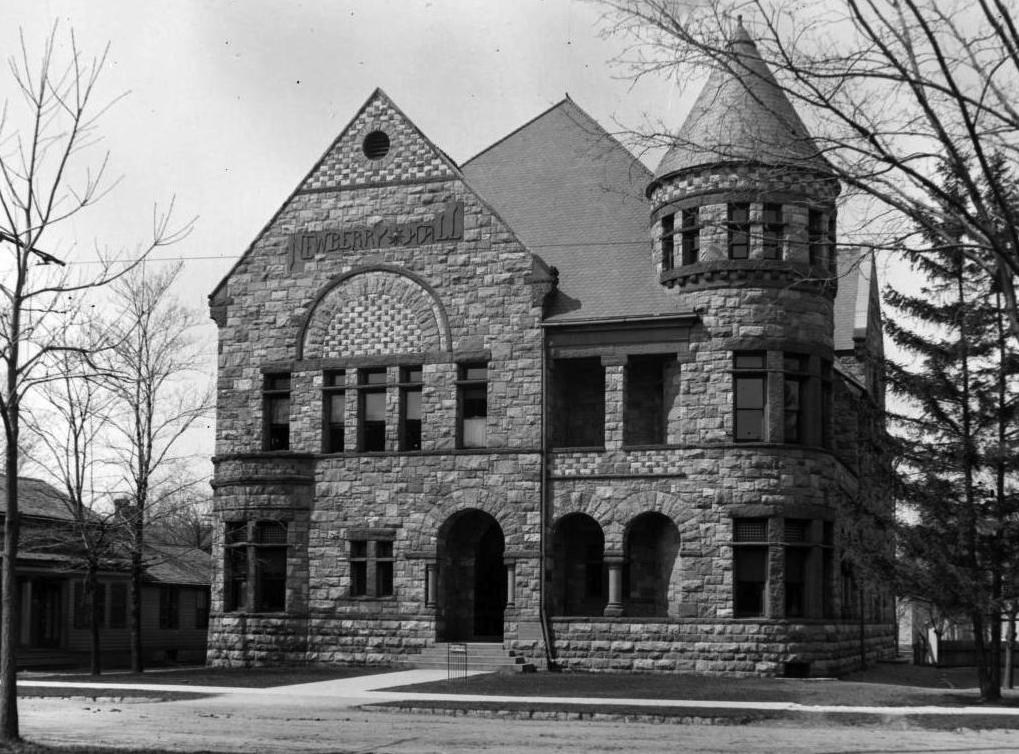Newberry Hall: From Meetings to Museum
Did you know that the Kelsey Museum used to be called Newberry Hall?
Susan B. Anthony, Reverend Anna Shaw, and Mary Wright Sewell once roamed the halls of the Kelsey Museum
A Home for the Students’ Christian Association
Prior to 1890, the lot that Kelsey Museum now sits on was vacant (Stoner, Beck, and Pauli 1880). In 1883, the Students’ Christian Association started collecting donations to purchase the lot for $2,500 (“Order of services at dedication of Newberry Hall” 1890, 3). The lot was considered a perfect choice for the Association due to its proximity to campus as well as the Congregational Church.
That little lot between the First Ward School and the Congregational Church sat vacant for five more years, as the Students’ Christian Association raised funds to construct a permanent building. Finally, in 1888, the Students’ Christian Association had raised enough funds to start building due to the generosity of a donation by Mrs. Helen H. Newberry in honor of her late husband John H. Newberry (“Order of services at dedication of Newberry Hall” 1890, 3). By 1991, the building had been completed, and students could enjoy their new meeting place (“A Description of the New Headquarters of the S.C.A” 1891).

The Young Women’s Christian Association, a part of the S.A.C., meeting at Newberry Hall
Controversial Compensation

The S.A.C. defending its choice to host political speakers.
An article in “The Michigan Daily” from 1891 describes the controversial nature of Newberry Hall due to its hosting of political speakers. It claims that University authorities have never allowed political speakers to rent out University halls, and that the Students’ Christian Association should hold to the same standards (“Communication” October 22, 1891). Newberry Hall stood firm in it’s mission to “encourage an interest in political matters” (“Communication” October 24, 1891). Political speakers at Newberry Hall often were in support of the Students’ Christian Association’s views, but that was not always the case.
Susan B. Anthony
Newberry Hall’s controversial policy on speakers allowed the likes of Reverend Anna Shaw, May Wright Sewell and Susan B. Anthony to speak at the University (“University Notes” 1893; “University Notes” 1894). Today, Mrs. Susan B. Anthony is often regarded as the most famous woman in relation to the Women’s Suffrage movement in the United States. She was considered a controversial speaker by the Students’ Christian Association however, because not all members of the association supported woman’s suffrage (“Students Christian Association Bulletin” 1880-1884, 12). In 1894, she spoke on the topic of suffrage to women in Newberry Hall, in part because it was the only venue that she could speak at on campus (“Susan B. Anthony Speaks Entertainingly of Some Phases of Woman Suffrage” 1894). Her speech was part of the Woman’s Suffrage Convention that resulted in the founding of the Ann Arbor Equal Suffrage Association (Anthony and Stanton 1902, 758; “University Notes” 1893).

One of the classrooms in Newberry Hall where people would hold meetings and other events.
Pro-Prohibitionists
One thing that all members could agree on was the issue of temperance; they were for it. Flipping through the pages of their bulletin, you would be hard pressed to find one that does not mention a speaker of meeting on the subject of temperance (“Students Christian Association Bulletin” 1880-1884). Newberry Hall was the meeting place for both the Young Women’s Christian Temperance Club and the Students Prohibition Club (“Students Christian Association Bulletin” 1880-1884).
University Acquisition of Newberry Hall
In 1917, the Students Christian Association and moved most of their meetings to the newer Lane Hall, as Newberry Hall was beginning to deteriorate and they lacked the funds to fix it (“Lane Hall is and Example of Beauty and Utility” 1917; “Newberry Hall” 1917). The University began leasing rooms in Newberry Hall in 1921, and in 1928 they completely remodeled it into a museum (“Newberry Hall to be Remodeled into Museum for Classics” 1928). At which point, the Students Christian Association was dwindling and talk of donating Newberry Hall to the University arose. Finally, in 1936 Newberry Hall was gifted to the University (Shaw 2000, 190).


The Kelsey Museum of Archaeology
In 1953 Newberry Hall was renamed, “Francis W. Kelsey Museum of Archaeology” (Kelsey Museum of Archaeology 1976). Francis W. Kelsey was a Latin professor at the University of Michigan in the early 20th century, who had the idea for the 1928 Classics Museum (Crittenden 1868-1933). Today, the museum’s website boasts that it “houses over 100,000 artifacts, ranging from prehistoric through medieval times” (Kelsey Museum of Archaeology). As you walk through the collections of the museum, you could be standing in very place that Susan B. Anthony once stood.
Sources
-
“A Description of the New Headquarters of the S.C.A.” Michigan Daily Digital Archives, October 3, 1891.
-
[“Collections U-M LSA Kelsey Museum of Archaeology.”](https://lsa.umich.edu/kelsey/collections.html) Accessed April 24, 2017. -
“Communication.” Michigan Daily Digital Archives , October 22, 1891.
-
“Communication.” Michigan Daily Digital Archives, October 24, 1891.
-
Crittenden, Albert Robinson. “Albert Robinson Crittenden Papers, 1868-1933.,” 1933 1868.
-
Kelsey Museum of Archaeology. Kelsey Museum of Archaeology Publications. Kelsey Museum of Archaeology, 1976.
-
“Lane Hall Is and Example of Beauty and Utility.” Michigan Daily Digital Archives, February 28, 1917.
-
“Newberry Hall.” Michigan Daily Digital Archives, April 22, 1917.
-
“Newberry Hall to Be Remodeled into Museum for Classics.” Michigan Daily Digital Archives, November 25, 1928.
-
Pauli, C. J. “Ann Arbor, Mich., 1890.” Milwaukee, Wis.: C. J. Pauli, 1890.
-
Shaw, Wilfred B., ed. “Gifts to the University of Michigan.” The University of Michigan, an Encyclopedic Survey, 2000.
-
Stanton, Elizabeth Cady, Susan Brownell Anthony, Matilda Joslyn Gage, and Ida Husted Harper. History of Woman Suffrage: 1900-1920. Fowler & Wells, 1922.
-
Stoner, and Beck & Pauli. “Panoramic View of the City of Ann Arbor, Washtenaw Co. Michigan, 1880.” Madison, Wis.: J. J. Stoner, 1880.
-
Student Christian Association (University of Michigan). Order of Services at Dedication of Newberry Hall. Services at the Dedication of Newberry Hall 16. Ann Arbor, Mich.: Inland Press, 1891.
-
Students’ Christian Association (University of Michigan). “Students Christian Association Bulletin” 1–5 (1880-1884).
-
“Susan B. Anthony Speaks Entertainingly of Some Phases of Woman Suffrage.” Michigan Daily Digital Archives, January 15, 1894.
-
“University Notes.” Michigan Daily Digital Archives, December 13, 1893.
- “University Notes.” Michigan Daily Digital Archives, May 1, 1894.